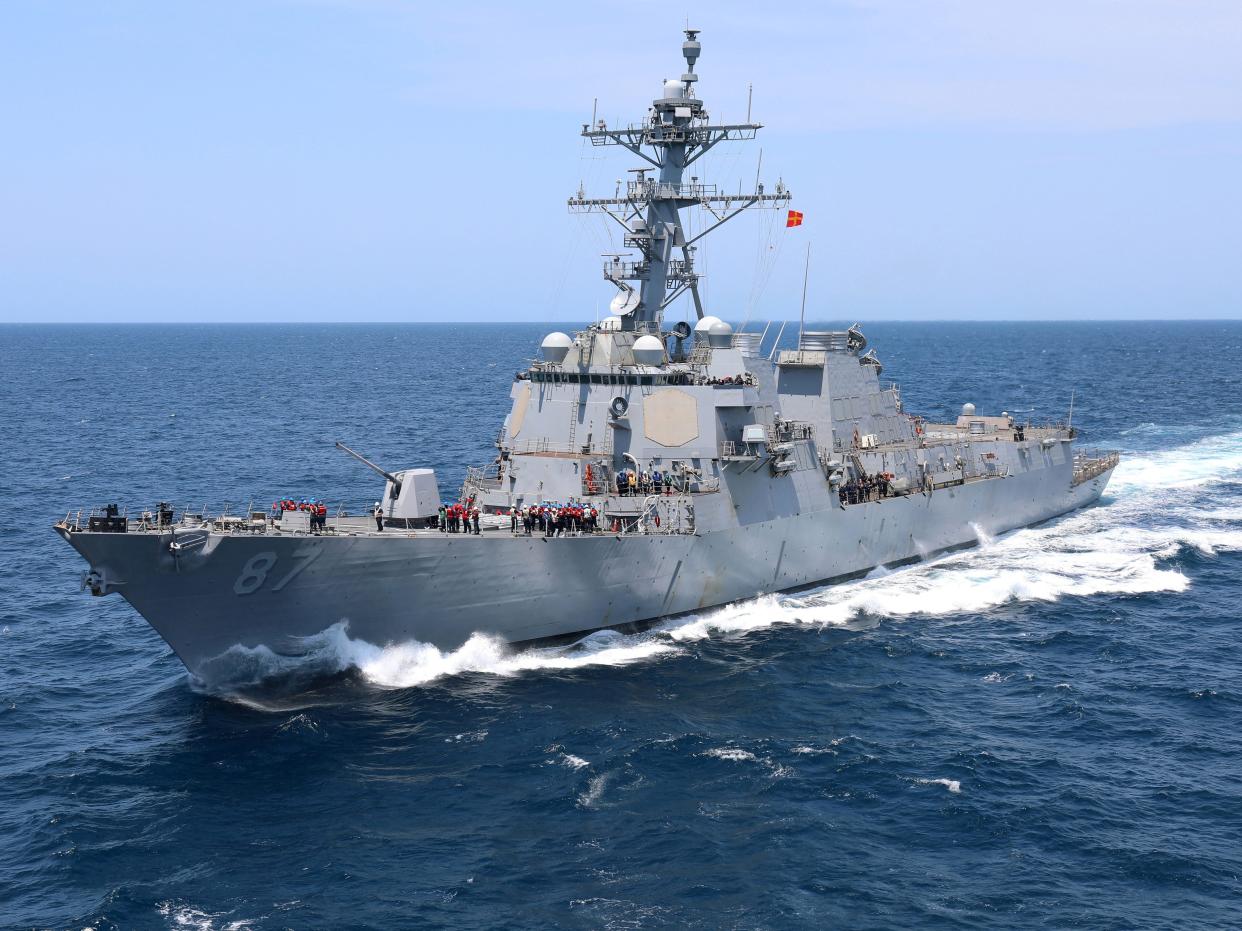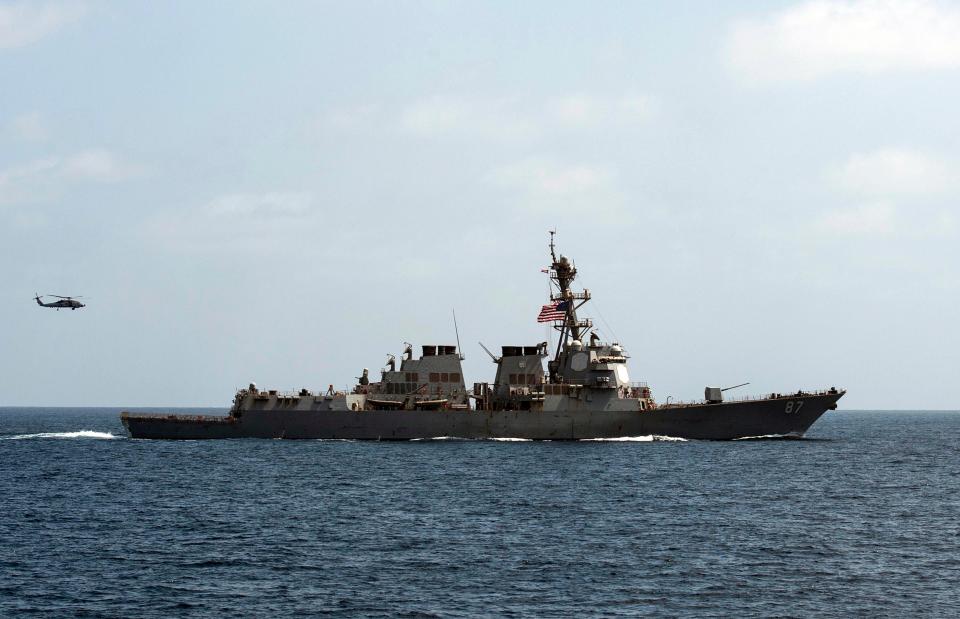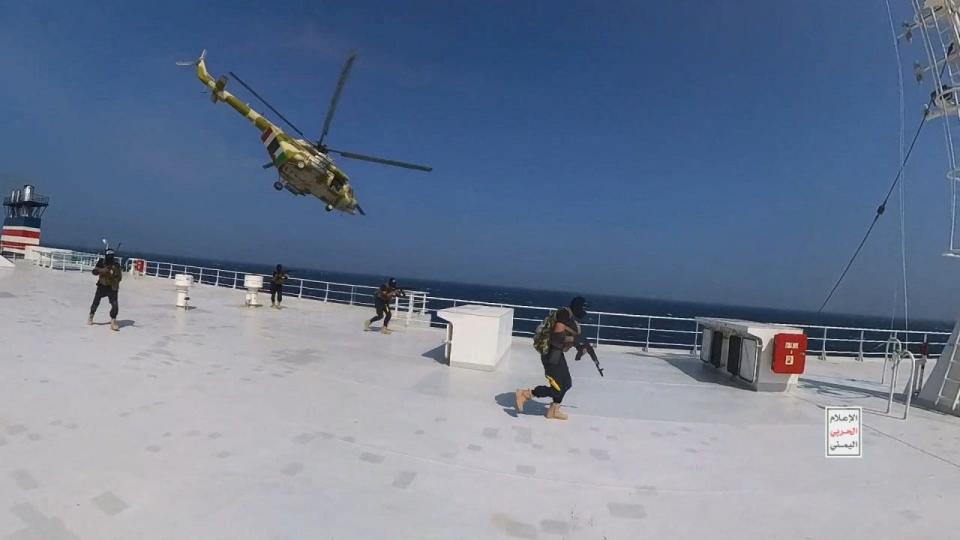Missiles were fired toward a US Navy destroyer responding to an attempted hijacking near Yemen. The same warship was targeted in this area years ago.

Missiles were fired from Houthi-controlled territory toward a US Navy ship responding to an attempted hijacking on Monday.
The ship, the destroyer USS Mason, was targeted by the Iran-backed rebels near Yemen a few years ago.
The Houthis' involvement in the Israel-Hamas war has led the US to take defensive measures.
Missiles were fired from Houthi-controlled territory on Monday toward a US Navy destroyer that rescued a commercial vessel from an attempted hijacking off the coast of Yemen. It's the same American warship that the Iran-backed rebels targeted in the area a few years ago.
USS Mason responded on Sunday to a distress call from the M/V Central Park, which came under attack from an "unknown entity," US Central Command (CENTCOM) said in a statement.
When the Mason arrived at the scene alongside allied ships, they demanded the release of the Central Park. Five armed individuals left the ship and tried to flee on a small boat, but the Mason chased them down and forced their surrender, CENTCOM said, adding that the crew of the Central Park is safe.
A Pentagon official later told Business Insider the initial assessment indicates that the attackers were Somali pirates.
But as the Mason wrapped up its response to the Central Park distress call shortly before 2 a.m. local time on Monday morning, two ballistic missiles were fired from Houthi-controlled territory in Yemen "toward the general location" of the two ships, CENTCOM said. The missiles landed around 10 nautical miles from the ships in the Gulf of Aden, a body of water that separates Yemen from Somalia, and there was no damage or injuries reported from either vessel.
A CENTCOM official told Insider the missiles came from an area in Yemen known for significant Houthi activity but did not say definitely that the Houthis were behind the missile launch.

"Maritime domain security is essential to regional stability," said Gen. Michael Erik Kurilla, the CENTCOM commander, in a statement. "We will continue to work with allies and partners to ensure the safety and security of international shipping lanes."
The Mason, an Arleigh Burke-class destroyer, is part of the Dwight D. Eisenhower Carrier Strike Group (CSG), which was dispatched to the eastern Mediterranean in mid-October in response to the Israel-Hamas war. Earlier this month, the CSG sailed through the Suez Canal into the Red Sea, and the US Navy said on Sunday that it had traveled through the Strait of Hormuz and into the Arabian Gulf. Elements of a strike group are sometimes spread out over an area, as opposed to bunched together.
Monday's incident marks the second time in recent years that the Mason has had missiles fired in its direction in this area.
In 2016, Houthi rebels launched missiles at the warship and another US Navy vessel, prompting the Mason to fire its own missiles to intercept the inbound threats. The US military later retaliated by launching several strikes on coastal radar sites in Yemen.
"Those who threaten our forces should know that the US commanders retain the right to defend their ships, and we will respond to this threat at the appropriate time and in the appropriate manner," the Pentagon said at the time.

The missiles fired Monday missed the Mason by a great distance, but a Pentagon official told Business Insider that the warship and the Central Park were still in the direct path of the threats.
Given the point of origin for the missiles, Monday's incident potentially marks a notable escalation in what has been a string of provocations by the Houthis since the Israel-Hamas war began more than seven weeks ago.
The Houthis have launched drones and missiles that US Navy warships in the Red Sea have had to shoot down. Last week, CENTCOM said a destroyer on patrol downed "multiple one-way attack drones" that came from Yemen. And the militants also shot down an American MQ-9 Reaper drone that was operating in international airspace earlier this month.
The Iran-backed rebels also staged a dramatic helicopter raid on November 19 of an internationally flagged cargo ship and hijacked the vessel, taking its entire crew hostage. Israeli Prime Minister Benjamin Netanyahu slammed the incident as "another act of Iranian terrorism."
The Houthis have also directed their attacks at Israeli territory, firing long-range missiles and drones and forcing the Israel Defense Forces (IDF) to activate the upper layer of its sophisticated air-defense network.
The Houthis are one of several Iran-backed groups now directly involved in the conflict. Hezbollah in Lebanon routinely exchanges fire with the IDF across the border, while US forces based in Iraq and Syria have come under fire dozens of times in recent weeks from Iran-backed militias.
Read the original article on Insider


